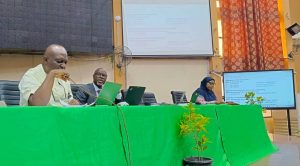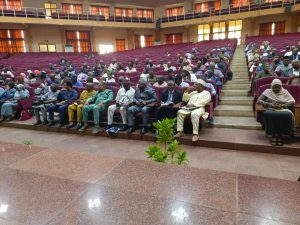

The Senate of the University of Ilorin has approved the establishment of the two new Centres, the Centre for Blue and Regenerative Economy and the Centre for Gender Studies.
This was one of the major highlights of the 301st meeting of the University Senate held at the University Auditorium.
A statement by the University’s Director of Corporate Affairs, Mr Kunle Akogun, said that the Senate meeting unanimously approved the establishment of the Centres following separate presentations of the recommendations of the BCOS by its Chairman, Prof. Olubunmi Abayomi Omotesho, who is also the Deputy Vice-Chancellor (Academic).
 Mr Akogun quoted the Chairman of the Senate and Vice-Chancellor, Prof. Wahab Olasupo Egbewole, SAN, as saying that the University Administration was the first to meet the initiator of the blue economy globally, Gunter Pauli, even before he met with the Federal Government of Nigeria.
Mr Akogun quoted the Chairman of the Senate and Vice-Chancellor, Prof. Wahab Olasupo Egbewole, SAN, as saying that the University Administration was the first to meet the initiator of the blue economy globally, Gunter Pauli, even before he met with the Federal Government of Nigeria.
He said that Mr. Pauli assured the University management of support, adding that UNILORIN is hoping to leverage the relationship to allow the Centre to prosper.
 According to the report of the Committee, the concept of the Blue Economy emphasises the sustainable use of oceans and freshwater resources while minimising environmental degradation.
According to the report of the Committee, the concept of the Blue Economy emphasises the sustainable use of oceans and freshwater resources while minimising environmental degradation.
The report stated that to fully capitalise on their potential and address environmental challenges, Nigerian universities must prioritise their roles as centres for the production of knowledge and building capacities to drive the emerging sustainable economy referred to as the “Blue and Regenerative Economy.”
The committee also recommended that the proposed Centre for Blue and Regenerative Economy should have a Board whose head shall be appointed by the Vice-Chancellor, and the management team should be headed by a Director who will be assisted by deputy directors.
On the other hand, the committee for the establishment of the Centre for Gender Studies explained that the Centre will provide a platform to critically examine and challenge traditional gender norms, roles, and stereotypes that perpetuate inequalities. It added that by promoting gender-sensitive curricula and inclusive teaching practices, academic institutions can help overcome biases and promote equal opportunities for people of all genders.
According to the Committee, the Gender Studies programmes are essential for advancing the global agenda for gender equality. They equip students with knowledge and tools to advocate for women’s rights, challenge gender-based discrimination, and promote social justice and this aligns with the Beijing Declaration.
The report added that the gender studies will amplify the experiences, perspectives, and contributions of women and girls by making their voices and stories visible and empowering underrepresented groups, as well as challenging male-centric biases in traditional academic disciplines.
